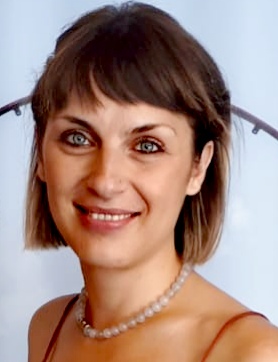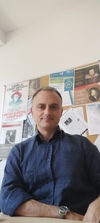Studying at the University of Verona
Here you can find information on the organisational aspects of the Programme, lecture timetables, learning activities and useful contact details for your time at the University, from enrolment to graduation.
Academic calendar
The academic calendar shows the deadlines and scheduled events that are relevant to students, teaching and technical-administrative staff of the University. Public holidays and University closures are also indicated. The academic year normally begins on 1 October each year and ends on 30 September of the following year.
Course calendar
The Academic Calendar sets out the degree programme lecture and exam timetables, as well as the relevant university closure dates..
| Period | From | To |
|---|---|---|
| I semestre (Lingue e letterature straniere) | Sep 26, 2022 | Dec 23, 2022 |
| II semestre (Lingue e letterature straniere) | Feb 13, 2023 | May 27, 2023 |
| Session | From | To |
|---|---|---|
| ESAMI LINGUE - sessione invernale | Jan 9, 2023 | Feb 11, 2023 |
| ESAMI LINGUE - sessione estiva | May 29, 2023 | Jul 22, 2023 |
| ESAMI LINGUE - sessione autunnale | Aug 28, 2023 | Sep 23, 2023 |
| Session | From | To |
|---|---|---|
| LAUREE LINGUE - sessione autunnale (a.a. 2021-2022) | Nov 7, 2022 | Nov 12, 2022 |
| LAUREE LINGUE - sessione straordinaria (a.a. 2021-2022) | Mar 31, 2023 | Apr 6, 2023 |
| LAUREE LINGUE - sessione estiva (a.a. 2022-2023) | Jul 10, 2023 | Jul 15, 2023 |
Exam calendar
Exam dates and rounds are managed by the relevant Foreign Languages and Literatures Teaching and Student Services Unit.
To view all the exam sessions available, please use the Exam dashboard on ESSE3.
If you forgot your login details or have problems logging in, please contact the relevant IT HelpDesk, or check the login details recovery web page.
Should you have any doubts or questions, please check the Enrollment FAQs
Academic staff
Study Plan
The Study Plan includes all modules, teaching and learning activities that each student will need to undertake during their time at the University.
Please select your Study Plan based on your enrollment year.
1° Year
| Modules | Credits | TAF | SSD |
|---|
1st foreign language2nd foreign language1st foreign literature2nd foreign literature1 module between the following2° Year activated in the A.Y. 2023/2024
| Modules | Credits | TAF | SSD |
|---|
1st foreign language2nd foreign language1st foreign literature2nd foreign literature3° Year It will be activated in the A.Y. 2024/2025
| Modules | Credits | TAF | SSD |
|---|
1st foreign language1st foreign literature2nd foreign language2nd foreign literature1 module among the following (philology related to 1st or 2nd foreign language)1 module between the following| Modules | Credits | TAF | SSD |
|---|
1st foreign language2nd foreign language1st foreign literature2nd foreign literature1 module between the following| Modules | Credits | TAF | SSD |
|---|
1st foreign language2nd foreign language1st foreign literature2nd foreign literature| Modules | Credits | TAF | SSD |
|---|
1st foreign language1st foreign literature2nd foreign language2nd foreign literature1 module among the following (philology related to 1st or 2nd foreign language)1 module between the following| Modules | Credits | TAF | SSD |
|---|
Legend | Type of training activity (TTA)
TAF (Type of Educational Activity) All courses and activities are classified into different types of educational activities, indicated by a letter.
History of Theatre and Performing Arts (2024/2025)
Teaching code
4S02252
Teacher
Coordinator
Credits
6
Language
Italian
Scientific Disciplinary Sector (SSD)
L-ART/05 - PERFORMING ARTS
Period
I semestre (Lingue e letterature straniere) dal Sep 23, 2024 al Dec 21, 2024.
Courses Single
Authorized
Learning objectives
By analysing specific issues of the History of theatre, we intend to introduce the student to the theoretical and methodological tools offered by the representative medium with a particular regard to the comparison between different theatrical traditions. At the end of the course students will be able to contextualise, comprehend and examine on their own all the coefficients proposed by a prose show.
Prerequisites and basic notions
None.
Program
Course content In the last twenty years of the nineteenth century the idea of theatrical writing delivered by tradition entered into crisis and new ways of dramaturgical writing began to be investigated. In some of the most famous plays by Strindberg, Ibsen and Chekhov, interpersonal relationships are elaborated negatively, that is, showing the difficulties that continually stand in the way of communication. With a lucid and ruthless gaze, Henrik Ibsen, unsurpassed inventor of the theater of the bourgeois living room, portrays "the aridity of relationships and the brutality of instincts" of his contemporary society. Starting from some recent translations of his most famous dramas, much more careful than in the past not to misunderstand the scenic codes developed by the Norwegian author, during the lessons the hypocrisies and impulses hidden by the labyrinthine and claustrophobic structure of the plays will be highlighted. his living rooms. Reference texts 1. Notes from lessons and in-depth materials. Non-attending students will integrate the bibliography with the study of: Luigi Allegri, First lesson on theatre, Rome-Bari, Laterza, 2012. 2. Analysis of three plays by Ibsen chosen from the following: A Doll's House; Spectra; The wild duck; Rosmer House; The Lady of the Sea; Hedda Gabler. 3. Analysis of two supporting plays (one for each author): Chekhov: The Seagull; Uncle Vanya; The three sisters; The cherry orchard. Strindberg, The Father; Miss Julie; Dance of Death. 4. Analytical study of the following essays: Franco Perrelli, Teatro scandinavo, Rome, Carocci, 2024; Peter Szondi, Theory of modern drama, Torino Einaudi, 2000 (pp. 3-15); F. Perrelli, Henrik Ibsen. A profile, Bari, Page, 2006; R. Alonge, Ibsen. Opera and scenic fortune, Florence, Le Lettere, 1995, pp. 7-76. 5. Luigi Allegri (ed.), Reading the theatre, Rome, Carocci, 2023 (pp. 13-33). 6. Detailed analysis of a drama chosen from among the following starting from the analysis proposed in the volume Luigi Allegri (ed.), Reading the theatre, Rome, Carocci, 2023: Sophocles, Antigone; Machiavelli, The Mandrake; Shakespeare, Hamlet; Molière, Don Giovanni or The Stone Guest; Goethe, Faust; Hugo, Ernani; Chekhov, The Cherry Orchard; Pirandello, Six Characters in Search of an Author; Samuel Beckett, Waiting for Godot. 7. Study of the following manual: Roberto Alonge, Franco Perrelli, History of theater and entertainment, third edition, Turin, Utet, 2019, (chapters 1-12, pp. 1-259, excluding all insights marked with a sideline).
Bibliography
Didactic methods
Lectures alongside the analysis of sources of various kinds (archive documents, iconography, theatrical performances, films, video fragments, audio, etc.).
Conferences, sources, readings, and critical texts will be further specified during the course. Some materials, necessary for the preparation of the exam, will be available in the e-learning site. The critical commentary of the theatrical or cinematographic adaptations analysed during the lectures will be part of the examination. A specific bibliography will be provided for ERASMUS students.
N.B .
1. For the study of the manual, a cycle of free-attendance in-depth lessons will be activated.
2. Students not able to attend the lessons are invited to send an e-mail to the teacher.
Learning assessment procedures
Oral interview divided into two parts, to be held on the same day, with final evaluation expressed by a mark out of thirty.
Evaluation criteria
The questions proposed to the candidates will, on the one hand, test their knowledge of the History of theatre with exemplifications offered by one of the dramas of the list; on the other hand, they will test the ability to analyze theoretical concepts and performances following the models showed during the lessons.
Criteria for the composition of the final grade
The final grade is determined by the average of the scores obtained in the two parts of the exam.
Exam language
Italiano
Type D and Type F activities
Nei piani didattici di ciascun Corso di studio è previsto l’obbligo di conseguire un certo numero di CFU di tipologia D e di tipologia F.
CFU D (attività a scelta dello studente)
I CFU D possono essere acquisiti mediante:
- insegnamenti non obbligatori nel proprio piano didattico (previa approvazione del Presidente del Collegio didattico per insegnamenti non selezionabili in autonomia)
- attività accreditate dal Collegio didattico
- competenze linguistiche (diverse o ulteriori) rispetto a quelle obbligatorie
- tirocini o stage
- TALC (competenze trasversali).
Competenze trasversali TALC
Nota bene: i corsi TALC sono riconosciuti solo come CFU D.
Il numero di CFU D va calcolato complessivamente sull’intero triennio/biennio e non è legato all'annualità.
CFU F
I CFU F sono solitamente relativi ad abilità informatiche, competenze linguistiche, stage e tirocini e ulteriori attività formative accreditate in questa tipologia dal Collegio Didattico.
Nel corso di laurea in Lingue e Letterature Straniere sono previste le seguenti tipologie:
- 3 CFU per terza lingua (livello B1)
- 3 CFU per informatica.
Le competenze informatiche possono essere acquisite attraverso:
- il superamento della prova pratica presso le aule informatiche di Ateneo,
- la frequenza dei corsi attivati da scuole e centri accreditati dall’AICA (Associazione Italiana per l’Informatica e il Calcolo Automatico) o riconosciuti dalla Provincia e dalla Regione e superamento della relativa prova finale. Le domande per il riconoscimento delle competenze informatiche acquisite precedentemente vengono esaminate dalla Commissione per il riconoscimento delle Competenze Informatiche.
Lo studente ha comunque la possibilità di effettuare esperienze di stage e tirocini che però vengono riconosciuti all’interno dei crediti a scelta libera (CFU D).
To discover all the teaching activities accredited by the foreign teaching college click here
Career prospects
Module/Programme news
News for students
There you will find information, resources and services useful during your time at the University (Student’s exam record, your study plan on ESSE3, Distance Learning courses, university email account, office forms, administrative procedures, etc.). You can log into MyUnivr with your GIA login details: only in this way will you be able to receive notification of all the notices from your teachers and your secretariat via email and also via the Univr app.
Student login and resources
Gestione carriere
Assegnazione tutore
Attività accreditate D/F
Calendario didattico dettagliato
Cambio lingua curriculare
Competenze informatiche
Competenze linguistiche (prima e seconda lingua)
Competenze linguistiche in triennale (terza lingua CFU F)
Compilazione del piano didattico
Corso di Lingua portoghese
Erasmus+ e altre esperienze all'estero
Linguistic training CLA
Presentazione dei corsi di studio e Open day
Graduation
Saperi minimi
Stage e tirocini
Le attività di stage sono finalizzate a far acquisire allo studente una conoscenza diretta in settori di particolare interesse per l’inserimento nel mondo del lavoro e per l’acquisizione di abilità professionali specifiche.
Le attività di stage sono svolte sotto la diretta responsabilità di un singolo docente presso studi professionali, enti della pubblica amministrazione, aziende accreditate dall’Ateneo veronese.
I crediti maturati in seguito ad attività di stage saranno attribuiti secondo quanto disposto nel dettaglio dal “Regolamento d’Ateneo per il riconoscimento dei crediti maturati negli stage universitari” vigente.
- Tutte le informazioni in merito agli stage per futuri studenti sono disponibili alla pagina Stage e tirocini.
- Tutte le informazioni in merito agli stage per studenti iscritti sono pubblicate in MyUnivr - come fare per - stage e tirocini.
- Tutte le informazioni in merito agli stage per le aziende sono disponili alla pagina Stage e tirocini per azienze.
Ulteriori informazioni al seguente link https://www.univr.it/it/i-nostri-servizi/gestione-carriere-studenti-lingue-e-letterature-straniere/stage-e-tirocini-lingue-e-letterature-straniere

 stefano.aloe@univr.it
stefano.aloe@univr.it
 +39 045802 8409
+39 045802 8409
















































